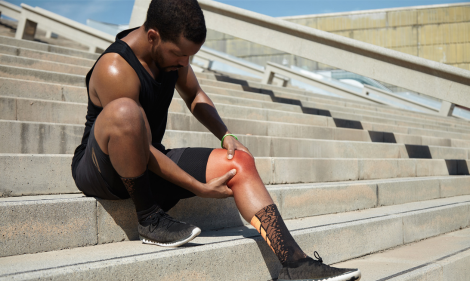Your knees are crucial for daily movement, absorbing impact, and maintaining stability. During a car accident, sudden forces from collisions or dashboard impacts can cause severe trauma to the knee joint. Injuries may range from soft tissue damage to fractures or ligament tears, limiting mobility and causing long-term pain if untreated.
At Specialty Care Clinics, we provide comprehensive care for knee injuries resulting from car accidents — combining advanced diagnostics, personalized treatment, and targeted rehabilitation programs.

How Car Accidents Cause Knee Injuries
Knee injuries often result from the impact, twisting, or compression during a collision.
Common Causes:
- Dashboard Impact: Direct force can fracture the kneecap or tibial plateau.
- Twisting Motion: Sudden rotation may tear ligaments or meniscus.
- Seatbelt Pressure: Restricts movement, causing soft tissue strain.
- Compression Injuries: Trapped legs can crush bones or damage cartilage.
- Low-Speed Accidents: Even minor collisions can strain ligaments or cartilage.
Types of Knee Injuries After a Car Accident
1. Ligament Tears
Ligaments stabilize the knee. Common injuries include:
- ACL (Anterior Cruciate Ligament) Tear: Often caused by twisting forces.
- PCL (Posterior Cruciate Ligament) Injury: Dashboard impact is a common cause.
- MCL/LCL Injuries: Side collisions can stretch or tear these ligaments.
Symptoms: Pain, swelling, instability, popping or clicking sounds.
2. Meniscus Tears
The meniscus cushions the knee joint and absorbs shock.
Symptoms: Locking, swelling, stiffness, or difficulty bending the knee.
3. Fractures
Fractures can affect the kneecap (patella) or tibial plateau.
Symptoms: Severe pain, swelling, deformity, inability to move the knee.
4. Dislocations
A knee dislocation is a medical emergency that can damage nerves and blood vessels.
Symptoms: Visible deformity, intense pain, inability to move the leg.
5. Soft Tissue Injuries
Even without fractures, muscles, tendons, and ligaments may be bruised or strained.
Symptoms: Pain, stiffness, limited range of motion, swelling.
⚠️ Recognizing Symptoms
- Pain or tenderness
- Swelling or bruising
- Popping or clicking sounds
- Instability or giving way
- Difficulty walking or standing
- Limited bending or straightening
Early evaluation prevents chronic pain, ligament instability, or post-traumatic arthritis.
Diagnosis at Specialty Care Clinics
- Physical Examination: Checks stability, flexibility, and pain response.
- X-rays: Detect fractures or bone displacement.
- MRI: Reveals ligament, meniscus, and cartilage injuries.
- Ultrasound: Visualizes soft tissue damage.
- Arthroscopy: Minimally invasive evaluation in complex cases.
Treatment Options
Treatment depends on severity and type of injury:
1. Non-Surgical Care
- Rest, Ice, Compression, Elevation (RICE)
- Pain relief and anti-inflammatory medications
- Physical therapy for strength and mobility
- Braces or supports for stabilization
2. Surgical Care
- Arthroscopic Surgery: Repairs meniscus or ligament
- Knee Reconstruction: For severe ACL or PCL tears
- Fracture Fixation: Plates, screws, or rods stabilize bones
- Partial Joint Replacement: For extensive cartilage damage
Rehabilitation and Recovery
Recovery focuses on restoring strength, mobility, and stability:
- Physical therapy for range of motion and muscle strengthening
- Balance and stability training
- Gradual return-to-activity programs
- Pain management and monitoring
Recovery Timeline:
- Mild sprains: 2–4 weeks
- Ligament/meniscus injuries: 3–6 months
- Post-surgical recovery: 6–12 months
Preventing Future Knee Injuries
- Adjust seat and legroom to reduce dashboard impact risk
- Strengthen quadriceps and hamstrings
- Use seatbelts properly
- Follow all rehabilitation and physical therapy instructions
Conclusion
Knee injuries after a car accident can severely affect mobility and daily life. Early diagnosis, expert treatment, and guided rehabilitation are essential for regaining strength and preventing long-term complications.
At Specialty Care Clinics, our orthopedic specialists provide advanced diagnostics, surgical expertise, and tailored rehabilitation programs — helping patients recover confidence and mobility.
Don’t let knee pain limit your life — get expert care today.
Visit Specialty Care Clinics – Auto Injury
Learn more about Knee Injury Treatment
❓ FAQs About Knee Injuries
Q1. How soon should I see a doctor for knee pain after an accident?
Immediately — early evaluation prevents worsening injuries like ligament tears or fractures.
Q2. Can knee injuries heal without surgery?
Yes, mild strains or partial tears may heal with rest, therapy, and bracing.
Q3. What if knee pain appears days after the accident?
Delayed pain can indicate hidden injuries; consult a specialist for imaging.
Q4. How long does ACL surgery recovery take?
Typically 6–9 months with consistent therapy and rehabilitation.
Q5. Why choose Specialty Care Clinics for knee injury care?
We offer advanced imaging, minimally invasive surgery, and personalized rehabilitation for complete recovery.
